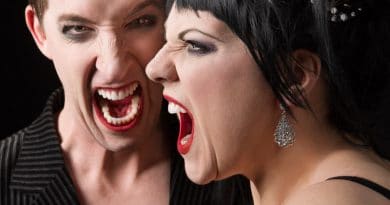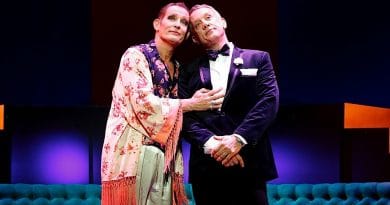Review: Beyond Desire – Hayes Theatre Co
At the end of Beyond Desire, a world premiere musical crammed into the Hayes theatre, the cast asks the audience, a la the cheeky ending of The Mousetrap, not to reveal its plot twists outside the theatre.
It’s a cute number, and gives local theatre icon Nancye Hayes a fun self-referential joke to deliver, but it’s unnecessary. No one is going to reveal the show’s ending; no one could possibly be shocked by a twist that feels so tacked-on that they would rave about it like they would the surprise in The Sixth Sense.
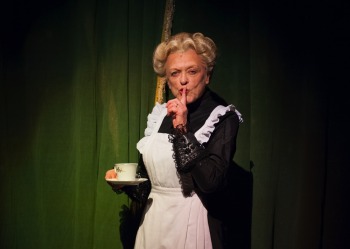
Written, directed, produced, and probably entirely creatively engineered by Neil Rutherford (designer Luther Forinder, for example, only exists in other reviews for this show), Beyond Desire is a long-developed, rather unexciting amalgamation of Hamlet, E.M Forster’s Maurice, and probably Upstairs/Downstairs too. It’s an aggressively shallow murder mystery that’s either a comedy or a drama (it can’t make up its mind), and it believes in its own importance a little too much.
It’s boring, which is perhaps its most obvious problem. It does attempt to say something about fathers and children, and about forbidden love, and about sexuality, in that it introduces these themes and then forgets to do anything meaningful with them, leaving them to hang limply in the air as the book staggers from line to line and plot point to plot point.
It’s about yet another upper-class family that has wealth and success but is going to be torn apart by dark secrets.
And it’s about yet another plucky cook and maid who don’t have money or formal education, but are knowing and kind of fun and have stronger values than their masters.
And it’s about yet another sweet, tenor-voiced gay bohemian who is in love with the brooding heartthrob that keeps all his feelings so hidden he ends up frustratingly blank.
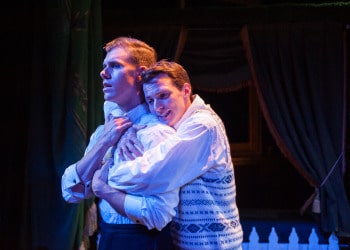
It’s all been done before, so much so that Beyond Desire feels completely pointless. It says nothing new about any of these things, and it doesn’t address any of these old tropes in any kind of interesting or articulate way – it doesn’t tell old stories with a new or deeper richess. It’s the same old, same old, and it’s irritating in its poorness. It feels amateurish, which is mind-boggling considering the calibre of the cast.
The book is a mess; poorly structured and surprisingly disconnected to the dramatic function of song (the songs tell us what we already know, or recount facts, rather than lifting the story to new places – we can’t invest in the songs and thus they repeatedly fall flat), and the orchestrations are pretty but that doesn’t excuse the heavy sameness of the musical numbers. The second act feels almost like a repeat of the first, musically speaking, featuring reprise after reprise, callback after callback. Rather than suggesting consistent, coherent sound, it just sounds lazy, old, and un-inventive.
Rutherford’s direction is pat and muddled and the show never gets out of its uneven tone. Nancye Hayes brings laughs with her scheming cook, but emotional moments land with a clunk rather than with a sigh or pained gasp. When something unexpected happens to our lead character Anthony (Blake Bowden), the audience is much closer to laughter than tears, and they do laugh. The actors move from mark to mark in well-worn patterns driven by a striving for symmetry in blocking that’s never fully realised and feels achingly restrictive.
The staging doesn’t work effectively within such a small space; you can’t shrink down a set for a larger stage and expect it to work perfectly and not feel crampe forced. There’s no room to breathe on the Beyond Desire set; it’s dark and oppressive, and not in a thematic way. It inhibits the storytelling. The lighting (Nicholas Rayment) makes everything and everyone look tired and sad, and the shapes and suggestions of furniture could have been minimised to let us better suspend our disbelief, rather than being so rigid. That the dead father (the victim of the murder mystery, played as a doleful ghost by Phillip Lowe) retreats back to stand inside an empty picture frame and ape his portrait in the study ends up seeming too literal.
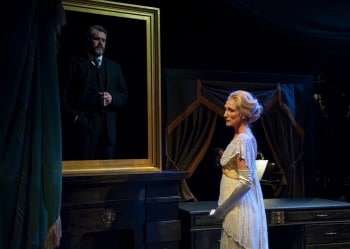
The six-piece orchestra is lovely, but it takes up so much space in the Hayes that when you factor in housing it all, plus the elaborate set, the show and its actors just feel so boxed-in, suffocated, and almost like an afterthought. There’s a liberation to storytelling in a small space that Forinder (Rutherford), completely hasn’t found, and it’s such a let-down after the run of good work the Hayes has produced to date.
For a venue that has in its almost-year of operation as Hayes Theatre Co shown an incredible diversity in staging, this show is such a disappointment. Maybe it’s too early to say, since it has only been a year, but Beyond Desire feels completely out of step at the Hayes. It isn’t up to the level of any of its previous productions. It’s a poor show, with poor creative values. It has an excellent cast, but most of them don’t do well in this show (Nancye Hayes, Ross Hannaford and Christy Sullivan are the only compelling performers, which is far more about their natural talent than about the work they’re getting to do). The production is modulated at almost every level for a much bigger theatre (the sound is loud and forceful and not well-mixed), which does its audiences a disservice.
Everyone involved in this show can and should be producing work of a higher quality than Beyond Desire. It was a failure, but, as Beckett said: try again. Fail better.
Please, next time, fail better.

